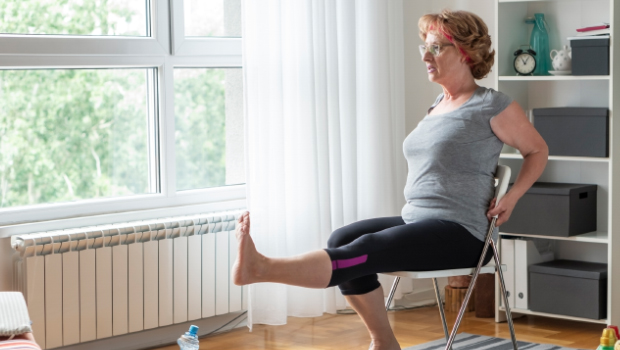Relieving chronic pain with CBT

Cognitive behavioral therapy with yoga-based movement helps with pain for those on long-term opioids — from Dr. Lynn DeBar
A new study shows that a program of cognitive behavioral therapy (CBT) that includes yoga-based movement reduces pain and disability for people with chronic pain who are taking long-term opioids. What's more, primary care team members can provide the CBT program at their clinics. The study in Annals of Internal Medicine was led by Kaiser Permanente Washington Health Research Institute Senior Investigator Lynn DeBar, PhD.
"Our study is unique because it targeted those on long-term opioid treatment, was embedded in primary care, and had frontline clinicians deliver CBT that included a yoga-based, adapted movement component," said Dr. DeBar.
CBT is a method for learning skills to cope with challenges such as chronic pain. The study found that 1 in 4 participants in the CBT program reported more than 30% reduction in pain compared to 1 in 6 who continued to receive care as usual. "Improvements in pain and function were sustained over a year," said Dr. DeBar, "so this type of skill-based, CBT intervention has the potential to be offered in primary care to help people with ongoing pain."
CBT and movement therapy for chronic pain
Chronic pain is one of the most common reasons people visit primary care clinics. Opioid medications may be prescribed to help patients cope with ongoing pain, but they have not been shown to have longer-term benefits on functioning for most patients and they have safety risks. For these reasons, primary care clinicians and their patients need new options for managing pain.
To test practical ways of helping people with chronic pain, Dr. DeBar's randomized trial was pragmatic, meaning it was built into the regular clinical workflow of participating Kaiser Permanente clinics in the Georgia, Northwest, and Hawaii regions. The CBT and yoga-based movement intervention was delivered by behavioral specialists and nurses who worked at the clinics. The study recruited broadly, so the 850 participants represented the clinics' patient populations: Study volunteers saw physicians at the clinics and had a variety of types of chronic pain. All were receiving opioids for their pain at the time of enrollment, and many had other physical and mental health conditions.
Half the study participants continued their usual care and half had 12 weekly sessions of CBT that included training in yoga-based adaptive movement, which might start with stretching while seated, for example. Over the one-year study period, all participants were asked quarterly about their pain, functioning, pain-related disability, and satisfaction with care using questions routinely asked in clinical care. Use of medications by participants, including opioids, was determined from electronic health records.
Sustained improvements
Compared to participants who continued to receive usual care, volunteers who participated in the CBT and yoga-based movement sessions reported greater improvements in pain and function. The improvements continued for the full follow-up period. Participants in the CBT program also reported greater satisfaction with their primary care and their pain-related health services.
The study did not focus on reducing opioid use per se and did not observe treatment-related changes in opioid prescriptions, although opioid dose declined across all participants enrolled in the study. However, patients who received CBT showed a greater reduction in use of benzodiazepine, a medication prescribed for disorders such as anxiety.
Dr. DeBar and her team are building on the results showing that in-person CBT-based group programs can have a lasting impact on patients with chronic pain, with sustained improvements in pain-related functioning. They are currently evaluating one-on-one, telehealth-based versions of their program that might reduce barriers to participation and provide more cost-effective ways to make these types of CBT-based approaches for chronic pain management more widely available.
The study is "A Primary Care-Based Cognitive Behavioral Therapy Intervention for Long-Term Opioid Users with Chronic Pain: A Randomized Pragmatic Trial." Dr. DeBar's coauthors are Meghan Mayhew, MPH, Lindsay Benes, PhD, RN, CNS, Allison Bonifay, MA, LPC, Charles R. Elder, MD, MPH, Michael C. Leo, PhD, Carmit McMullen, PhD, David H. Smith, PhD, RPh, and William M. Vollmer, PhD, from Kaiser Permanente Northwest; Richard A. Deyo, MD, MPH, from Oregon Health and Science University; Francis J. Keefe, PhD, from Duke University; Ashli Owen-Smith, PhD, SM, from Kaiser Permanente Georgia; and Connie M. Trinacty, PhD, from the Queen’s Medical Center, Hawaii.
Research

HEAL responds to double crisis: Opioids and COVID-19
Health care is increasingly online—KPWHRI is studying telehealth options for opioid use disorder and chronic pain.
news release

NIH awards over $15 million in HEAL grants to KPWHRI
Drs. DeBar, Bradley, and Sherman lead projects in initiative to tackle opioid crisis.
Behind the scenes

Meeting participants' needs: Our research interventionists
Deborah King and Jessie Waiamau-Ariota describe their pivotal role in research on youth mental health — and more.


